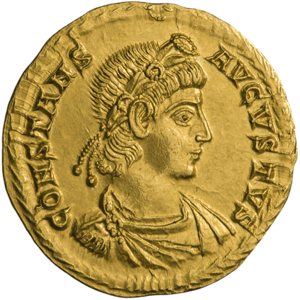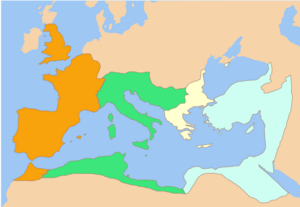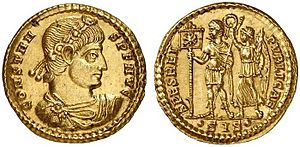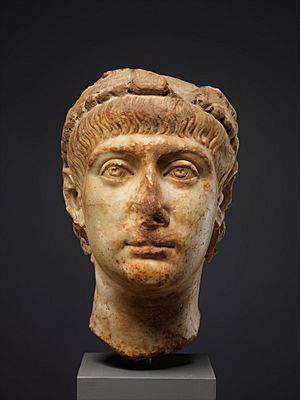Constans facts for kids
Quick facts for kids Constans |
|||||||||
|---|---|---|---|---|---|---|---|---|---|
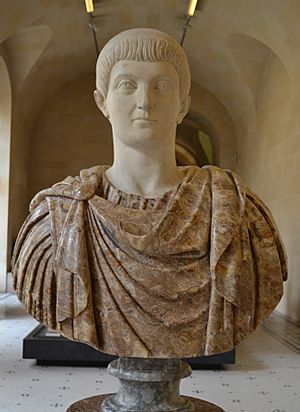
Possible head of Constans set in a modern bust (Louvre)
|
|||||||||
| Roman emperor | |||||||||
| Augustus | 9 September 337 – January 350 |
||||||||
| Predecessor | Constantine I | ||||||||
| Successor | Magnentius and Vetranio | ||||||||
| Co-rulers |
|
||||||||
| Caesar | 25 December 333 – 9 September 337 | ||||||||
| Born | 322 or 323 | ||||||||
| Died | January 350 (aged 27) Vicus Helena, southwestern Gaul |
||||||||
|
|||||||||
| Dynasty | Constantinian | ||||||||
| Father | Constantine I | ||||||||
| Mother | Fausta | ||||||||
| Religion | Nicene Christianity | ||||||||
Flavius Julius Constans (around 323 – 350), also known as Constans I, was a Roman emperor from 337 to 350 AD. He was the youngest son of Constantine the Great, a very famous Roman emperor. Constans held the important rank of Caesar from 333, which meant he was a junior ruler.
After his father died, Constans became an Augustus in September 337, sharing power with his older brothers. Constans was put in charge of the western parts of the Roman Empire, including Italy, Illyricum, and Africa. He quickly led a successful military campaign against the Sarmatians, a group of people living near the Roman borders.
Later, Constans had a civil war with his oldest brother, Constantine II, who invaded Italy in 340. Constans's army defeated Constantine II, who was killed in battle. This meant Constans gained control over even more territory, including Gaul. He also had some disagreements with his other brother, Constantius II, especially about religious matters. Constans fought against the Franks and even visited Roman Britain in 343, being the last Roman emperor to do so.
In January 350, a general named Magnentius declared himself emperor. Magnentius quickly took over and killed Constans. Some historical writings suggest that Constans had become unpopular with his army and the people before his death.
Early Life and Becoming Caesar
Constans was born around 323 AD. He was the third and youngest son of Emperor Constantine I and his second wife, Fausta. His grandfathers were also emperors, Constantius I and Maximian. When Constans was born, his father Constantine was the main emperor, and his older brothers already held the title of Caesar.
In 333 AD, when Constans was about ten years old, his father Constantine I made him a Caesar in Constantinople. This meant he was officially a junior emperor, alongside his brothers Constantine II and Constantius II. Constans was taught Latin by a famous poet named Aemilius Magnus Arborius.
Constans as Emperor (Augustus)
When his father Constantine I died in 337 AD, Constans and his two brothers, Constantine II and Constantius II, divided the vast Roman Empire among themselves. The army declared them all Augusti (senior emperors) on September 9, 337. Soon after, Constans had to deal with an invasion by the Sarmatians, and he won a big victory against them.
Constans gained control of more provinces after his cousin, Dalmatius, who was supposed to rule them, was killed. His oldest brother, Constantine II, felt he didn't get enough territory as the eldest son. This led to arguments between them. To keep the peace, Constans agreed to give Constantine II some provinces in Africa. However, they kept disagreeing over which parts belonged to whom.
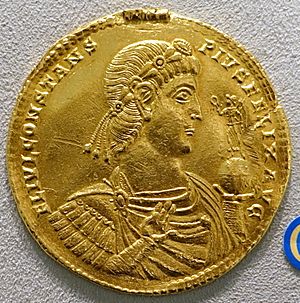
These tensions grew, and in 340 AD, Constantine II invaded Italy. Constans, who was in Dacia at the time, sent his best troops to stop him. Constantine II was trapped and killed near Aquileia. This meant Constans inherited all of his brother's lands, including Hispania, Britain, and Gaul.
Constans was an active emperor. In 341–342, he led a successful military campaign against the Franks. In early 343, he visited Roman Britain, likely for another military reason. He was the last Roman emperor to visit Britain.
When it came to religion, Constans was fair to Judaism. He also issued a law in 341 that banned pagan sacrifices. He supported Nicene Christianity, which was the main Christian belief, and disagreed with Arianism, a different Christian belief supported by his brother Constantius II. They even called a big meeting in 343 to try and solve their religious differences, but it didn't work.
Death of Constans
In the last years of his rule, Constans became less popular. He seemed to favor a small group of friends and lost the support of his army. On January 18, 350 AD, a general named Magnentius declared himself emperor in a city called Augustodunum (Autun). Magnentius had the support of the troops along the Rhine River and later, the western provinces.
When Constans heard about Magnentius, he had to run away because he didn't have much support. He tried to reach Hispania, but Magnentius's supporters caught him in a fort in Helena (Elne) in southwestern Gaul. Constans was killed there.
See also
 In Spanish: Constante (emperador) para niños
In Spanish: Constante (emperador) para niños
- Itineraries of the Roman emperors, 337–361
 | Janet Taylor Pickett |
 | Synthia Saint James |
 | Howardena Pindell |
 | Faith Ringgold |


